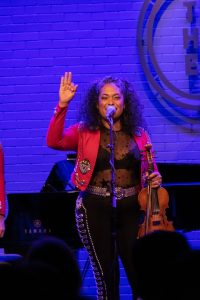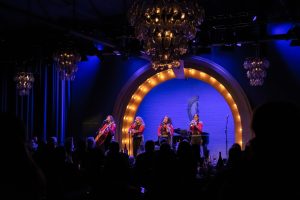
Flor de Toloache – L-R Elena Lacayo, Shae Fiol, Mireya Ramos & Ana Garcia – Courtesy of Britnee King. Used with permission.
From the moment they stepped onto The Cabaret stage, the four musicians, dressed in stylized mariachi costumes, who call themselves Flor de Toloache, Marichi Feminino, commanded the audience’s attention and held it firmly in place for their entire set during their one night stand on Friday, October 8. The advantage of writing one’s own blog is there are no deadlines, but at the risk of this review becoming old news, I am pleased to finally share it. For readers who are unfamiliar with Flor de Toloache, who, in actuality, occupy a relatively small niche in the music world, I feel it is imperative to spread the word about their uniqueness.

Flor de Toloache co-founder Mireya Ramos – Courtesy of Britnee King. Used with permission.
Playing to a full house of enthusiastic listeners, the four players in the Latin Grammy-winning, all-women, mariachi band, based in New York City, demonstrated why they buck tradition by performing a music style usually played by men. Making the group even more unique is the fact that, coming from diverse cultural backgrounds, they play Mexican music, which some of them did not grow up listening to. The group includes founder Mireya Ramos on violin and founding member Shae Fiol on vihuela. The duo had gained a following performing in New York City subways and founded Flor de Toloache in 2008.
As far as the band’s music and its brand, here’s a brief primer. Mariachi is a genre of music that originated in the 18th century in Western Mexico. With most of its song lyrics about machismo, love, betrayal, death, politics, revolutionary heroes and country life, it is quintessential Mexican music, but people all over the world connect to its soulfulness and celebratory qualities. Tied to Mexican culture, it is omnipresent at birthdays, weddings, quinceañeras, and parties of any kind.
As far as the group’s name Toloache, it’s an ancient flower that’s considered sacred in Mexico and is used in love potions because it’s believed to have magical properties. The founders chose the title because they felt it perfectly described their brand of mariachi, on which they placed their own stamp. Their sound is also unique for its fusion with other cultures and styles such as reggae, cumbia and even hip hop, all of which were clearly evident in their setlist with songs that were mostly in Spanish, with some English sprinkled in as well.
Besides co-founders Fiol and Ramos, the other two players were Anna Garcia on trumpet and Elena Lacayo on guitarrón and vocals. A special guest was Andres “Velcro” Ramos, brother of Mireya.
The show’s set was indicative of the group’s distinctive fusion of genres. After the show, while chatting with an audience member near my table, he commented how much he enjoyed the show that was everything from Nirvana to “Bésame mucho.” He was actually referring to a medley that encapsulated the width and breadth of the music performed. Highlights included songs such as “Paint it Black,” “Regresa,” “Dulces Recuerdos,” “No Hay Vuelta Atras,” “Juan Ga: Se Me Olvidó Otra Vez,” “Our Love,” “Let Down,” “Dicen,” “Blue Medley,” and “Besos de Mezcal,” which was the show’s finale.

Flor de Tloloache – Courtesy of Britnee King. Used with permission.
Ultimately, my foremost impression of the show, besides the wide variety of the music performed, was the musicianship of the players, the passion they conveyed and the stamina and energy they displayed throughout their entire set, which included minimal, yet informative, low-key banter with an audience that was totally engaged with the group of women. Their very presence spoke of the empowerment they spoke of, which they have gained as women and innovators in a music industry that still favors men. They are clearly role models for not only female musicians, but women, in general. They are also role models for Latinos everywhere for the exposure they are giving to music that has become an indelible part of American popular culture and world music in general.
For tickets and information about upcoming 2021-22 season at The Cabaret, visit thecabaret.org.





